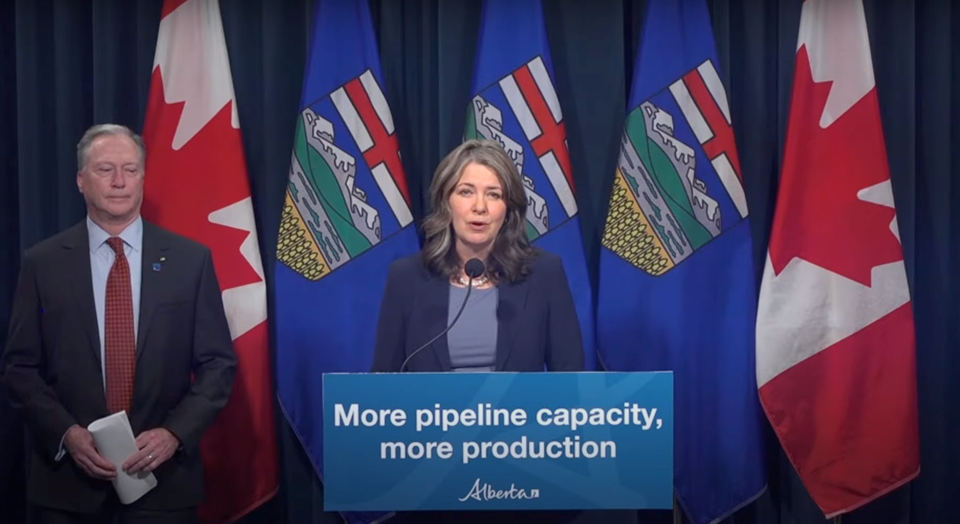LAKELAND – The Government of Alberta signed a letter of intent with Enbridge to help achieve its goal of doubling oil and gas production in the province.
During a Jan. 6 media conference, Alberta Premier Danielle Smith said increasing production will help meet growing energy demand across North America - which involves more oil exports to the United States.
Enbridge President and CEO Greg Ebel said Enbridge plans to further optimize its existing pipeline network and infrastructure to increase production to meet growing energy demands, driven by factors like the resurgence of domestic manufacturing and increased use of data centres and artificial intelligence.
While Ebel did not provide specific details on how Enbridge will improve its existing pipelines, he said the company already has a track record of increasing production through incremental growth of its mainline system’s capacity from 1.5 million barrels per day to 3.2 million barrels per day over the past decade.
“It’s that same kind of thing,” Ebel told members of the media. “It’s a little early to kind of give you all those details, but again, over the next couple of months and throughout the year, I think you’ll be impressed . . . by the producers here in the province and their ability to grow.”
This approach of improving existing pipelines will also be less impactful on stakeholders, communities, and the environment, said Ebel.
Added capacity
Smith also believes increasing production through a partnership with Enbridge will strengthen bonds with the United States.
The province’s plan to increase production involves finding ways to expand pipeline capacity, transportation, storage, and improving access to markets for Alberta’s energy products, which includes identifying opportunities to expand Enbridge’s existing network of over 29,000 kilometre pipelines across North America.
“This added capacity objective is critical to Alberta and our most important trading partner – the United States,” said Smith, explaining the province “directly supports” over 50 U.S.-based refineries with direct investment in over 20 U.S. states.
According to the premier, the province sells over 4.3 million barrels of heavy oil per day to the United States, which she said is about equivalent to the amount of light oil that the United States sells to European, Scandinavian, and Asian countries.
Smith believes increasing domestic production in Alberta and improving oil trade with the United States will also decrease the amount of heavy oil that the United States buys from regions like the Middle East.
“The U.S. needs to import heavy oil from somewhere and we believe we are a far better partner than Iraq, Iran, or Venezuela,” said Smith.
Regulations
The province will also look at improving and streamlining oil and gas regulations.
Smith said regulations “are too slow and too cumbersome and in no way reflect the need to compete with impending regulatory reform coming in the United States.” A working group, she said, will be established to directly engage with the Canada Energy Regulator to help improve regulations and reduce red tape.
Plans to improve regulations, streamline approvals, and boost production will also involve using Alberta’s existing bitumen royalty-in-kind program (BRIK), which has allowed the province to take royalties as physical barrels of bitumen.
Instead of taking royalties from oil companies in cash, the Alberta government can take its share as actual barrels of bitumen, which could be directly sold for revenue.
“Increasingly, Alberta's ability to move more oil and gas will encourage producers to increase production and start new capital projects in Alberta in support of our economic prosperity,” she said, explaining the province has already seen a seven per cent organic growth in the oil sands over the past year and expects further investment as pipeline capacity increases.
“Increased production means increased investment, increased jobs, and increased royalties for Albertans,” said Smith.
The Premier also said the government is currently in discussions with other pipelines companies to enhance Alberta’s oil and gas sector.
“This is the first of several types of announcements like this.”



